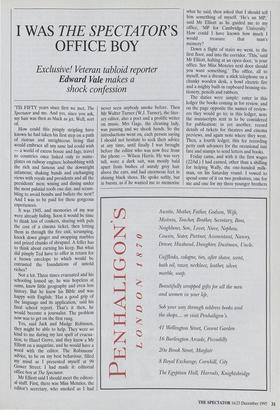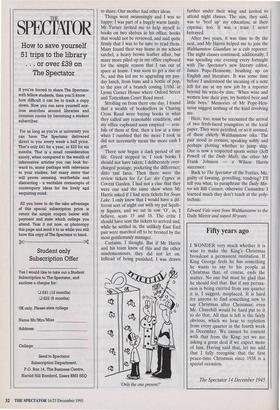I WAS THE SPECTATOR'S OFFICE BOY
Exclusive! Veteran tabloid reporter Edward Vale makes a shock confession 'TIS FIFTY years since first we met, The Spectator and me. And yes, since you ask, my hair was then as black as jet. Well, sort of.
How could this pimply stripling have known he had taken his first step on a path of riotous and unrighteous living that would embrace all any sane lad could wish — a world of excess booze and fags; travel to countries once linked only to name- plates on railway engines; hobnobbing with the rich and famous and the downright infamous; shaking hands and exchanging views with royals and presidents and all the presidents' men; wining and dining under the most palatial roofs one day, and scram- bling to avoid bombs and bullets the next? And I was to be paid for these gorgeous experiences.
It was 1945, and memories of my war were already fading. Soon it would be time to think less of conkers, sharing with pals the cost of a cinema ticket, then letting them in through the fire exit, scrumping, knock down ginger and swapping marbles and prized chunks of shrapnel. A feller has to think about earning his keep. But what did pimply Ted have to offer in return for a brown envelope to which would be entrusted the foundations of untold riches?
Not a lot. Three times evacuated and his schooling loused up, he was hopeless at sums, knew little geography and even less history. But he knew his Bible and was happy with English: 'Has a good grip of the language and its application,' said his final school report. That's it then, he would become a journalist. The problem now was to get on the first rung.
Yes, said Jack and Madge Robinson, they might be able to help. They were so kind to me during my last spell of evacua- tion, to Hazel Grove, and they knew a Mr Elliott on a magazine, and he would have a word with the editor. The Robinsons' advice, to be on my best behaviour, filled my mind as I presented myself at 99 Gower Street. I had made it: editorial office boy at The Spectator.
Mr Elliott said I should meet the editori- al staff. First, there was Miss Menzies, the editor's secretary, who smoked as I had never seen anybody smoke before. Then Mr Walter Turner (W.J. Turner), the liter- ary editor, also a poet and a prolific writer on music. Mrs Gage, the cleaning lady, was passing and we shook hands. So the introductions went on, each person saying I should not hesitate to seek their advice at any time, until finally I was brought before the editor who was now free from the phone — Wilson Harris. He was very tall, wore a dark suit, was mostly bald apart from bushes of unruly grey hair above the ears, and had enormous feet in shining black shoes. He spoke softly, but in bursts, as if he wanted me to memorise what he said, then asked that I should tell him something of myself. 'He's an MP,' said Mr Elliott as he guided me to my office, 'MP for Cambridge University.' How could I have known how much I would treasure that man's memory?
Down a flight of stairs we went, to the first floor, and into the corridor. 'This,' said Mr Elliott, halting at an open door, 'is your office. See Miss Menzies next door should you want something.' The office, all to myself, was a dream: a stick telephone on a chunky wooden desk, a bowl electric fire and a mighty built-in cupboard housing sta- tionery, pencils and rubbers.
The duties were simple: enter in this ledger the books coming in for review, and on the page opposite the names of review- ers they would go to; in this ledger, note the manuscripts sent in to be considered for publication; in yet another, record details of tickets for theatres and cinema previews, and again note where they went. Then, a fourth ledger, this for recording petty cash advances for the occasional taxi fare and stamps to send letters and books.
Friday came, and with it the first wages (22/6d.) I had earned, other than a shilling for helping Wally, the one-handed milk- man, on his Saturday round. I vowed to spend some of it on two penknives, one for me and one for my three younger brothers to share. ,Our mother had other ideas.
Things went swimmingly and I was so happy; I was part of a hugely warm family. Mr Turner invited me to help myself to books on two shelves in his office, books that would not be reviewed, and said quite firmly that I was to be sure to read them. Many found their way home in my school satchel, a heavy brown leather affair, but many more piled up in my office cupboard for the simple reason that I ran out of space at home. I was soon to get a rise of 5s., and this led me to upgrading my pay- day lunch, from buns and a bottle of pop, to the joys of a brunch costing 1/10d. at Lyons Corner House where Oxford Street and Tottenham Court Road meet.
Strolling on from there one day, I found that a wealth of booksellers in Charing Cross Road were buying books in what they called any reasonable condition, and my office cupboard soon emptied — arm- fuls of them at first, then a few at a time when I rumbled that the more I took in did not necessarily mean the more cash I got.
There now began a dark period of my life. Greed stepped in. I took books I should not have taken; I deliberately over- charged postage, pocketing the difference; ditto taxi fares. Then there were the review tickets for Le Lac des Cygnes at Covent Garden. I had not a clue that they were one and the same show when Mr Harris asked if I had seen tickets for Swan Lake. I only knew that I would have a dif- ferent sort of night out with my pal Squib- sy Squires, and we sat in row '0', in, I believe, seats 15 and 16. The critic I should have sent the tickets to arrived and, while he settled in, the unlikely East End pair were marched off to be berated by the most gentlemanly manager.
Curtains, I thought. But if Mr Harris and his team knew of this and the other misdemeanours, they did not let on. Ingtead of being punished, I was drawn `Only the one present?' further under their wing and invited to attend night classes. The aim, they said, was to 'beef up' my education; at their expense, too. It was a trust I never betrayed.
After two years, it was time to fly the nest, and Mr Harris helped me to join the Walthamstow Guardian as a cub reporter. The night classes continued; additionally, I was spending one evening every fortnight with The Spectator's new literary editor, James Pope-Hennessy, brushing up on English and literature. It was some time before I understood the meaning of a note left for me at my new job by a reporter beyond his write-by date: 'When wine and women lose their joys, try bottled beer and little boys.' Memories of Mr Pope-Hen- nessy suggest nothing of the kind involving me.
Here, too, must be recounted the arrival of two fresh-faced youngsters at the local paper. They were petrified, or so it seemed, of these elderly Walthamstow oiks. The pair stood in corners, speaking softly and perhaps plotting whether to jump ship. One is now a respected sports writer (Jeff Powell of the Daily Mail), the other Mr Frank Johnson — a Wilson Harris successor.
Back to The Spectator of the Forties. Me, guilty of fawning, grovelling, toadying? I'll tell you what, to paraphrase the Daily Mir- ror wit Bill Connor, otherwise Cassandra: I learned much they don't teach at the poly- technic.
Edward Vale went from Walthamstow to the Daily Mirror and stayed 30 years.











































































































 Previous page
Previous page